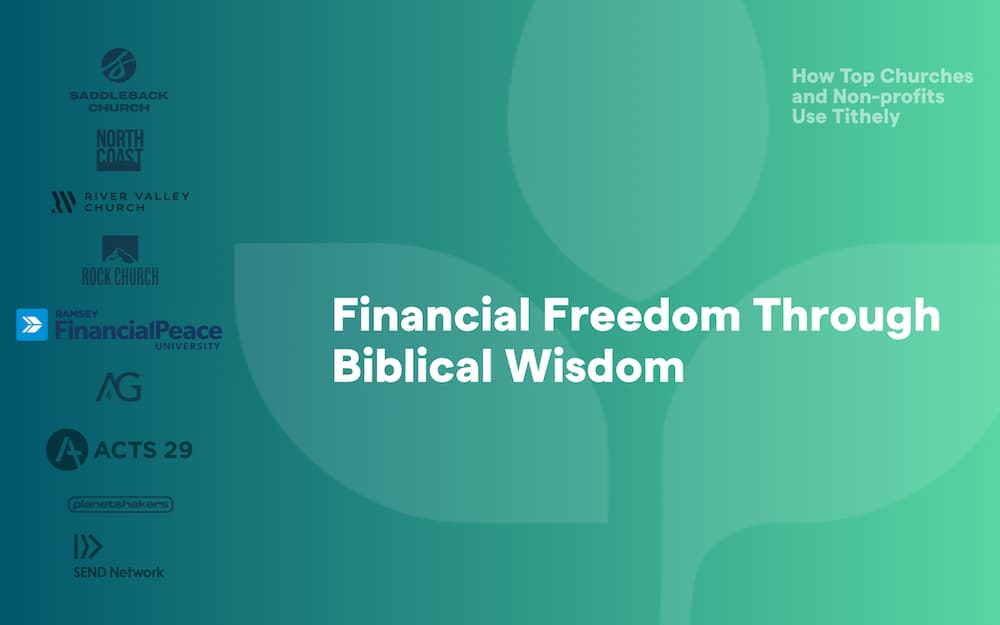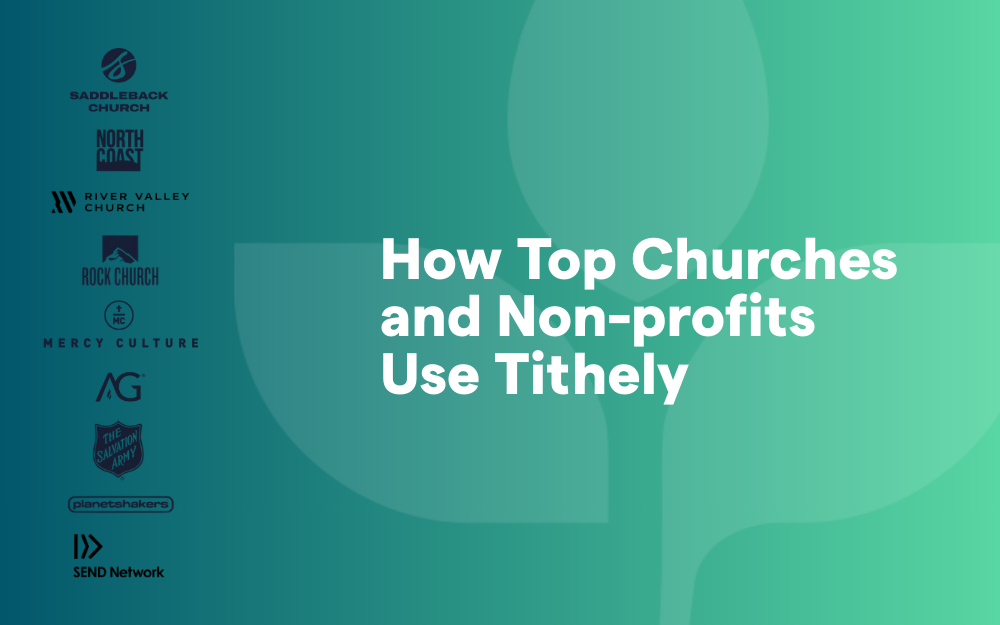Best Banks for Churches and Church Plants
We've done some ground work so you and your church can choose the best bank for your needs, now easier than ever!

This one goes out to anyone who ever conveniently took a coffee break during the finance break-out session at a church conference. We get it, you didn’t go into ministry because you wanted to manage finances or research the best banks for churches. However, whether your planting a church, or you're church is steadily growing, stewarding finances is a part of your job, and we have some intel to keep you from hating yourself later. Here is a condensed guide on how to pick the best bank for your church.
Before we list off the top-recommended banks, we’re going to let you in on an oft-overlooked fact. Choosing a bank is a positional decision. It matters where you are as a church at this moment, and where you see the future taking you. Putting this kind of thought into your decision now means less leg work or pivoting later. Do you have a staff member who is handling banking full-time? Send them this blog and get their thoughts. As you read through each point below, think about where you are, who is on your team, and where you are going.
Traditional vs. Digital Banking
One of the first questions to answer is whether a traditional or online-only bank is a better fit for your needs. The appeal of online banking is obvious and may seem like a no-brainer. However, don’t be too quick to discount traditional banking right off the bat. The rankings for traditional banks are consistently high, and often for good reasons.
This isn’t to discount online-only banks. By losing the brick and mortar you reap the savings in lower fees. Not to mention digital banks typically have better app integration. If you don’t handle cash or have large volume transactions, this could be the right choice for you.
TL; DR: If you have a cash-heavy giving base, full-service banking needs, or funding options - traditional is the way to go. If you want easy, integrated banking with lower fees, look into digital banking.
Important to note - if you’re a maverick and go the way of a Credit Union, ask about their ability to host accounts under the 501 c3 status.
Community Banking
Different banking institutions have different goals, like churches. Are you passionate about banking with an institution that does good in your local or missional community? You’ll want to ask that outright or search their website for details. Also, if you want to build a face-to-face relationship with your bank, location matters. You'll kick yourself later if you choose a bank that’s farther away than you or your staff are willing to travel.
TL; DR: It isn’t all about the money, honey and you need to decide where on your list you rank community development initiatives.
Banking Fees
The number of transactions you run can make an impact on your choice. If you are a small-medium size church, most options are open to you as long as you watch out for fees. Once a church reaches a bigger size, you don’t want to be trapped into a transaction limit penalty.
TL; DR: What size church are you now? What growth are you believing for, and will that mean a larger congregation or possibly multiple locations?
Questions to ask the bank
This is where we talk about the items you were eager to skip at that conference session. The nitty-gritty details of banks are as wide and varied as the seas, but here are some questions to ask a potential bank:
1. How many transactions are allowed per month?
2. What are the monthly fees?
3. Is there a minimum balance?
4. What are the online capabilities/integrations?
5. What does bill pay look like?
6. What is the APY on any balances?
TL; DR: Because math is hard, and coffee is finite - we have all the answers to these questions below.
Best Banks for Churches
Without further ado, here are the best banks for churches.
U.S. Bank
The overwhelming favorite and Marsha Brady of the bank world. What makes this one such a popular choice for nonprofits? It brings the best of both worlds together with full-service banking and no monthly fees. Note that this is for those of us wanting more of an “annual Christmas card” relationship with our bank since they have limited locations.
Wells Fargo
If you like custom-made experiences, this might be the place for you. They know how to host nonprofit accounts and they do it well. Not to mention, you can’t throw a rock without hitting one of these in most places. You will have some fees and they only allow for a smaller number of transactions.
PNC Bank
Like Wells Fargo, there are plenty of locations and considerations made for nonprofits. Look out for a monthly fee after your first 3 months though. Yet, for a traditional bank, they do a lot through the PNC Foundation initiatives that might be enough to sway you.
EverBank
This is an online-only bank with an impressive commitment to local initiatives and charities. You’ll have a minimum balance to contend with if you want to avoid fees, but you’ll also earn a robust APY compared to other institutions.
BlueVine
This one could be the winner if you’re happy with online-only. Ongoing APY, no fees, no transaction limits, and great integration. There are no community initiatives, but they make a difference by lending and banking with nonprofits.
Additional Banks to Consider:
6. BB&T
7. Citizens Bank
8. Chase Bank
9. Atlantic Capital
10. Citi Bank
We hope that this helped you feel less stressed and better equipped to find the best bank for you. We compiled much of this list from research conducted by Robi Mansueto at Fit Small Business. You can read her article here.
Other References:
The Balance Small Business: How to Find the Best Bank for Your Nonprofit by Joanne Fritz (2022)
Fit Small Business: 8 Best Banks for Nonprofits in 2024 by Robi Mansueto(2024)
Sign Up for Product Updates
This one goes out to anyone who ever conveniently took a coffee break during the finance break-out session at a church conference. We get it, you didn’t go into ministry because you wanted to manage finances or research the best banks for churches. However, whether your planting a church, or you're church is steadily growing, stewarding finances is a part of your job, and we have some intel to keep you from hating yourself later. Here is a condensed guide on how to pick the best bank for your church.
Before we list off the top-recommended banks, we’re going to let you in on an oft-overlooked fact. Choosing a bank is a positional decision. It matters where you are as a church at this moment, and where you see the future taking you. Putting this kind of thought into your decision now means less leg work or pivoting later. Do you have a staff member who is handling banking full-time? Send them this blog and get their thoughts. As you read through each point below, think about where you are, who is on your team, and where you are going.
Traditional vs. Digital Banking
One of the first questions to answer is whether a traditional or online-only bank is a better fit for your needs. The appeal of online banking is obvious and may seem like a no-brainer. However, don’t be too quick to discount traditional banking right off the bat. The rankings for traditional banks are consistently high, and often for good reasons.
This isn’t to discount online-only banks. By losing the brick and mortar you reap the savings in lower fees. Not to mention digital banks typically have better app integration. If you don’t handle cash or have large volume transactions, this could be the right choice for you.
TL; DR: If you have a cash-heavy giving base, full-service banking needs, or funding options - traditional is the way to go. If you want easy, integrated banking with lower fees, look into digital banking.
Important to note - if you’re a maverick and go the way of a Credit Union, ask about their ability to host accounts under the 501 c3 status.
Community Banking
Different banking institutions have different goals, like churches. Are you passionate about banking with an institution that does good in your local or missional community? You’ll want to ask that outright or search their website for details. Also, if you want to build a face-to-face relationship with your bank, location matters. You'll kick yourself later if you choose a bank that’s farther away than you or your staff are willing to travel.
TL; DR: It isn’t all about the money, honey and you need to decide where on your list you rank community development initiatives.
Banking Fees
The number of transactions you run can make an impact on your choice. If you are a small-medium size church, most options are open to you as long as you watch out for fees. Once a church reaches a bigger size, you don’t want to be trapped into a transaction limit penalty.
TL; DR: What size church are you now? What growth are you believing for, and will that mean a larger congregation or possibly multiple locations?
Questions to ask the bank
This is where we talk about the items you were eager to skip at that conference session. The nitty-gritty details of banks are as wide and varied as the seas, but here are some questions to ask a potential bank:
1. How many transactions are allowed per month?
2. What are the monthly fees?
3. Is there a minimum balance?
4. What are the online capabilities/integrations?
5. What does bill pay look like?
6. What is the APY on any balances?
TL; DR: Because math is hard, and coffee is finite - we have all the answers to these questions below.
Best Banks for Churches
Without further ado, here are the best banks for churches.
U.S. Bank
The overwhelming favorite and Marsha Brady of the bank world. What makes this one such a popular choice for nonprofits? It brings the best of both worlds together with full-service banking and no monthly fees. Note that this is for those of us wanting more of an “annual Christmas card” relationship with our bank since they have limited locations.
Wells Fargo
If you like custom-made experiences, this might be the place for you. They know how to host nonprofit accounts and they do it well. Not to mention, you can’t throw a rock without hitting one of these in most places. You will have some fees and they only allow for a smaller number of transactions.
PNC Bank
Like Wells Fargo, there are plenty of locations and considerations made for nonprofits. Look out for a monthly fee after your first 3 months though. Yet, for a traditional bank, they do a lot through the PNC Foundation initiatives that might be enough to sway you.
EverBank
This is an online-only bank with an impressive commitment to local initiatives and charities. You’ll have a minimum balance to contend with if you want to avoid fees, but you’ll also earn a robust APY compared to other institutions.
BlueVine
This one could be the winner if you’re happy with online-only. Ongoing APY, no fees, no transaction limits, and great integration. There are no community initiatives, but they make a difference by lending and banking with nonprofits.
Additional Banks to Consider:
6. BB&T
7. Citizens Bank
8. Chase Bank
9. Atlantic Capital
10. Citi Bank
We hope that this helped you feel less stressed and better equipped to find the best bank for you. We compiled much of this list from research conducted by Robi Mansueto at Fit Small Business. You can read her article here.
Other References:
The Balance Small Business: How to Find the Best Bank for Your Nonprofit by Joanne Fritz (2022)
Fit Small Business: 8 Best Banks for Nonprofits in 2024 by Robi Mansueto(2024)
podcast transcript
This one goes out to anyone who ever conveniently took a coffee break during the finance break-out session at a church conference. We get it, you didn’t go into ministry because you wanted to manage finances or research the best banks for churches. However, whether your planting a church, or you're church is steadily growing, stewarding finances is a part of your job, and we have some intel to keep you from hating yourself later. Here is a condensed guide on how to pick the best bank for your church.
Before we list off the top-recommended banks, we’re going to let you in on an oft-overlooked fact. Choosing a bank is a positional decision. It matters where you are as a church at this moment, and where you see the future taking you. Putting this kind of thought into your decision now means less leg work or pivoting later. Do you have a staff member who is handling banking full-time? Send them this blog and get their thoughts. As you read through each point below, think about where you are, who is on your team, and where you are going.
Traditional vs. Digital Banking
One of the first questions to answer is whether a traditional or online-only bank is a better fit for your needs. The appeal of online banking is obvious and may seem like a no-brainer. However, don’t be too quick to discount traditional banking right off the bat. The rankings for traditional banks are consistently high, and often for good reasons.
This isn’t to discount online-only banks. By losing the brick and mortar you reap the savings in lower fees. Not to mention digital banks typically have better app integration. If you don’t handle cash or have large volume transactions, this could be the right choice for you.
TL; DR: If you have a cash-heavy giving base, full-service banking needs, or funding options - traditional is the way to go. If you want easy, integrated banking with lower fees, look into digital banking.
Important to note - if you’re a maverick and go the way of a Credit Union, ask about their ability to host accounts under the 501 c3 status.
Community Banking
Different banking institutions have different goals, like churches. Are you passionate about banking with an institution that does good in your local or missional community? You’ll want to ask that outright or search their website for details. Also, if you want to build a face-to-face relationship with your bank, location matters. You'll kick yourself later if you choose a bank that’s farther away than you or your staff are willing to travel.
TL; DR: It isn’t all about the money, honey and you need to decide where on your list you rank community development initiatives.
Banking Fees
The number of transactions you run can make an impact on your choice. If you are a small-medium size church, most options are open to you as long as you watch out for fees. Once a church reaches a bigger size, you don’t want to be trapped into a transaction limit penalty.
TL; DR: What size church are you now? What growth are you believing for, and will that mean a larger congregation or possibly multiple locations?
Questions to ask the bank
This is where we talk about the items you were eager to skip at that conference session. The nitty-gritty details of banks are as wide and varied as the seas, but here are some questions to ask a potential bank:
1. How many transactions are allowed per month?
2. What are the monthly fees?
3. Is there a minimum balance?
4. What are the online capabilities/integrations?
5. What does bill pay look like?
6. What is the APY on any balances?
TL; DR: Because math is hard, and coffee is finite - we have all the answers to these questions below.
Best Banks for Churches
Without further ado, here are the best banks for churches.
U.S. Bank
The overwhelming favorite and Marsha Brady of the bank world. What makes this one such a popular choice for nonprofits? It brings the best of both worlds together with full-service banking and no monthly fees. Note that this is for those of us wanting more of an “annual Christmas card” relationship with our bank since they have limited locations.
Wells Fargo
If you like custom-made experiences, this might be the place for you. They know how to host nonprofit accounts and they do it well. Not to mention, you can’t throw a rock without hitting one of these in most places. You will have some fees and they only allow for a smaller number of transactions.
PNC Bank
Like Wells Fargo, there are plenty of locations and considerations made for nonprofits. Look out for a monthly fee after your first 3 months though. Yet, for a traditional bank, they do a lot through the PNC Foundation initiatives that might be enough to sway you.
EverBank
This is an online-only bank with an impressive commitment to local initiatives and charities. You’ll have a minimum balance to contend with if you want to avoid fees, but you’ll also earn a robust APY compared to other institutions.
BlueVine
This one could be the winner if you’re happy with online-only. Ongoing APY, no fees, no transaction limits, and great integration. There are no community initiatives, but they make a difference by lending and banking with nonprofits.
Additional Banks to Consider:
6. BB&T
7. Citizens Bank
8. Chase Bank
9. Atlantic Capital
10. Citi Bank
We hope that this helped you feel less stressed and better equipped to find the best bank for you. We compiled much of this list from research conducted by Robi Mansueto at Fit Small Business. You can read her article here.
Other References:
The Balance Small Business: How to Find the Best Bank for Your Nonprofit by Joanne Fritz (2022)
Fit Small Business: 8 Best Banks for Nonprofits in 2024 by Robi Mansueto(2024)
VIDEO transcript
This one goes out to anyone who ever conveniently took a coffee break during the finance break-out session at a church conference. We get it, you didn’t go into ministry because you wanted to manage finances or research the best banks for churches. However, whether your planting a church, or you're church is steadily growing, stewarding finances is a part of your job, and we have some intel to keep you from hating yourself later. Here is a condensed guide on how to pick the best bank for your church.
Before we list off the top-recommended banks, we’re going to let you in on an oft-overlooked fact. Choosing a bank is a positional decision. It matters where you are as a church at this moment, and where you see the future taking you. Putting this kind of thought into your decision now means less leg work or pivoting later. Do you have a staff member who is handling banking full-time? Send them this blog and get their thoughts. As you read through each point below, think about where you are, who is on your team, and where you are going.
Traditional vs. Digital Banking
One of the first questions to answer is whether a traditional or online-only bank is a better fit for your needs. The appeal of online banking is obvious and may seem like a no-brainer. However, don’t be too quick to discount traditional banking right off the bat. The rankings for traditional banks are consistently high, and often for good reasons.
This isn’t to discount online-only banks. By losing the brick and mortar you reap the savings in lower fees. Not to mention digital banks typically have better app integration. If you don’t handle cash or have large volume transactions, this could be the right choice for you.
TL; DR: If you have a cash-heavy giving base, full-service banking needs, or funding options - traditional is the way to go. If you want easy, integrated banking with lower fees, look into digital banking.
Important to note - if you’re a maverick and go the way of a Credit Union, ask about their ability to host accounts under the 501 c3 status.
Community Banking
Different banking institutions have different goals, like churches. Are you passionate about banking with an institution that does good in your local or missional community? You’ll want to ask that outright or search their website for details. Also, if you want to build a face-to-face relationship with your bank, location matters. You'll kick yourself later if you choose a bank that’s farther away than you or your staff are willing to travel.
TL; DR: It isn’t all about the money, honey and you need to decide where on your list you rank community development initiatives.
Banking Fees
The number of transactions you run can make an impact on your choice. If you are a small-medium size church, most options are open to you as long as you watch out for fees. Once a church reaches a bigger size, you don’t want to be trapped into a transaction limit penalty.
TL; DR: What size church are you now? What growth are you believing for, and will that mean a larger congregation or possibly multiple locations?
Questions to ask the bank
This is where we talk about the items you were eager to skip at that conference session. The nitty-gritty details of banks are as wide and varied as the seas, but here are some questions to ask a potential bank:
1. How many transactions are allowed per month?
2. What are the monthly fees?
3. Is there a minimum balance?
4. What are the online capabilities/integrations?
5. What does bill pay look like?
6. What is the APY on any balances?
TL; DR: Because math is hard, and coffee is finite - we have all the answers to these questions below.
Best Banks for Churches
Without further ado, here are the best banks for churches.
U.S. Bank
The overwhelming favorite and Marsha Brady of the bank world. What makes this one such a popular choice for nonprofits? It brings the best of both worlds together with full-service banking and no monthly fees. Note that this is for those of us wanting more of an “annual Christmas card” relationship with our bank since they have limited locations.
Wells Fargo
If you like custom-made experiences, this might be the place for you. They know how to host nonprofit accounts and they do it well. Not to mention, you can’t throw a rock without hitting one of these in most places. You will have some fees and they only allow for a smaller number of transactions.
PNC Bank
Like Wells Fargo, there are plenty of locations and considerations made for nonprofits. Look out for a monthly fee after your first 3 months though. Yet, for a traditional bank, they do a lot through the PNC Foundation initiatives that might be enough to sway you.
EverBank
This is an online-only bank with an impressive commitment to local initiatives and charities. You’ll have a minimum balance to contend with if you want to avoid fees, but you’ll also earn a robust APY compared to other institutions.
BlueVine
This one could be the winner if you’re happy with online-only. Ongoing APY, no fees, no transaction limits, and great integration. There are no community initiatives, but they make a difference by lending and banking with nonprofits.
Additional Banks to Consider:
6. BB&T
7. Citizens Bank
8. Chase Bank
9. Atlantic Capital
10. Citi Bank
We hope that this helped you feel less stressed and better equipped to find the best bank for you. We compiled much of this list from research conducted by Robi Mansueto at Fit Small Business. You can read her article here.
Other References:




























